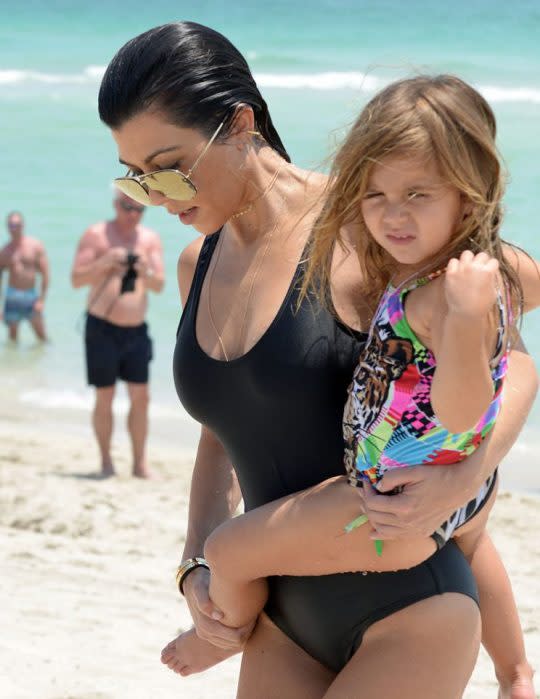Kourtney Kardashian Doesn't Want Her Mom Saying 'Fat' In Front of Her Daughter

So if there’s any Kardashian sister I can at all relate to, it’s Kourtney, the organic-loving, extended breastfeeding, natural-birthing one of the family. And now, it seems, we’re on the same page when it comes to banning the f-word — “fat,” that is — in front of our daughters.
I try never to utter the word (or anything similar) within earshot of my 7-year-old, whether about myself or someone else. And KK apparently has the same strategy regarding her 4-year-old, Penelope — at least judging from a minuscule (likely heavily-edited) conversation between the mom of three and her own mother, Kris Jenner, on the latest episode of Keeping Up With the Kardashians, which aired on Jun. 19.
When Jenner asked her daughter, “Do I look fat?” in a scene early on in the episode, Kardashian, who was in the midst of eating a salad, provided a single answer: “Don’t use that word in front of my daughter, please.”
Related: Kourtney Kardashian’s 3-Year-Old Daughter Does Makeup Better Than All of Us
“Okay,” Jenner replied, with slightly mocking laughter.
“My son, he uses that word in front of my daughter all day,” Kardashian continued. “It’s [what] he calls the paparazzi.”
The brief exchange stopped there, but for anyone sensitive to body image issues and young girls, it was one that jumped out.

With a culture that has more than 80 percent of its 10-year-old girls having been on a diet, most of which started the practice by age 8, the way we talk about body image and emulate confidence in front of those girls — and boys, for that matter — is critically important. Experts have pointed to many aspects that affect which road your girl will go down, from media to peers. But one of the biggest influences, it’s been noted time and again, is the same-sex parent of the child at risk — in other words, dads of sons and moms of daughters.
Related: Khloe Kardashian: ‘I’ve Been So Dope This Whole Time’
Leslie Sim, a child psychologist and clinical director of the Mayo Clinic’s eating disorders program, told USA Today, that “moms are probably the most important influence on a daughter’s body image.” Psychologists who have studied the influence of mothers say that it’s the strongest in the years before puberty, though it’s of course felt through adolescence and beyond, noted a Newsweek story on the topic.
The mother-daughter influence is one that Connecticut-based child and adolescent psychologist Barbara Greenberg sees often among young clients. “Every time I get a new adolescent girl in therapy who is having body-image issues, my first question is always, ‘How is your mother’s self-esteem about her body?’” she tells Yahoo Style. “I don’t think you can raise a young woman to feel good about her body if you can’t look in the mirror and feel good about your own.”
Regarding Kardashian’s approach to never say “fat” around Penelope, Greenberg says, “I am so in support of that. It would be lovely if it could be banned from our vocabulary.” That’s because of the word’s connotations, she says, and the negative messaging it carries. “It’s sort of become a word to describe not only how somebody sees their body, but it has taken on meaning ‘lazy,’ ‘unappealing,’ ‘unattractive,’ and people also use it to describe a feeling — ‘I feel fat.’ Fat is not a feeling.” But the feelings that could be activated by the word and its baggage, she adds, can be harmful.
“I would instead try to make a positive comment about myself each day, like ‘I feel good today,’” Greenberg says about the positivity she tried to project around her own now-adult daughter when she was young. “I would tell her, ‘There are enough negative messages out there. Your job is to be compassionate about yourself.”
Regarding the self-deprecating way that girls tend to self-reference, she adds, “It’s basically against ‘girl rules’ to say anything positive about yourself — they are very reluctant to say ‘I feel good about myself. We don’t want to play into that in any way.”
Follow us on Facebook, Instagram, and Pinterest for nonstop inspiration delivered fresh to your feed, every day.



